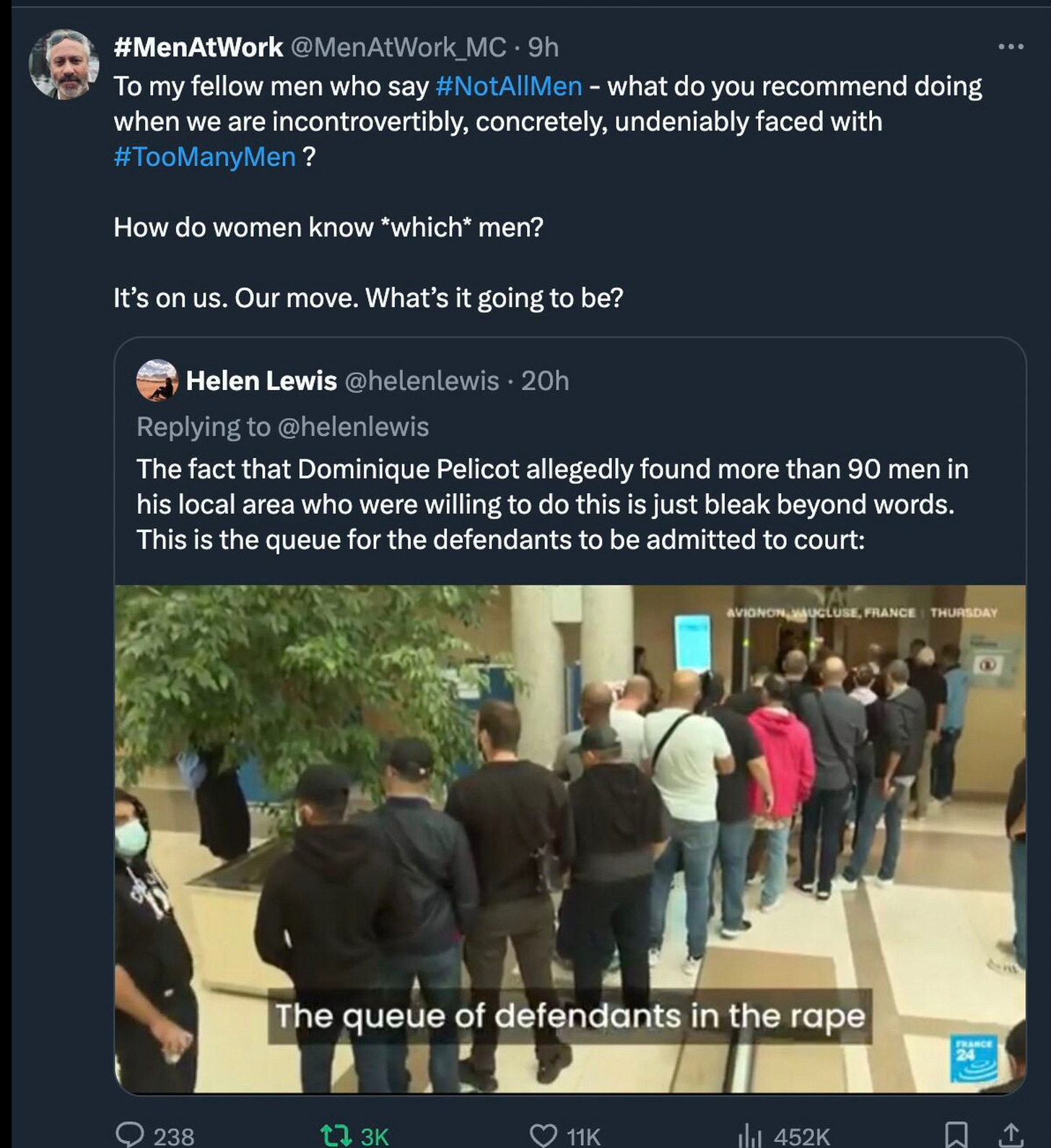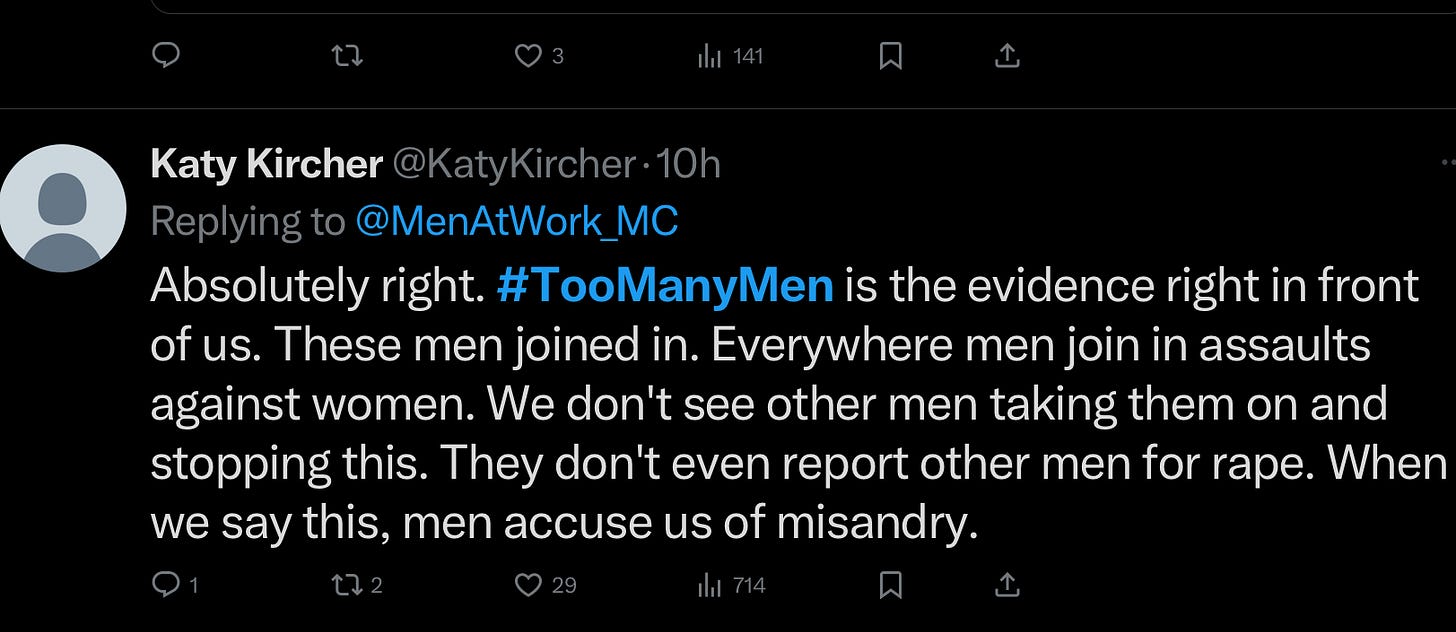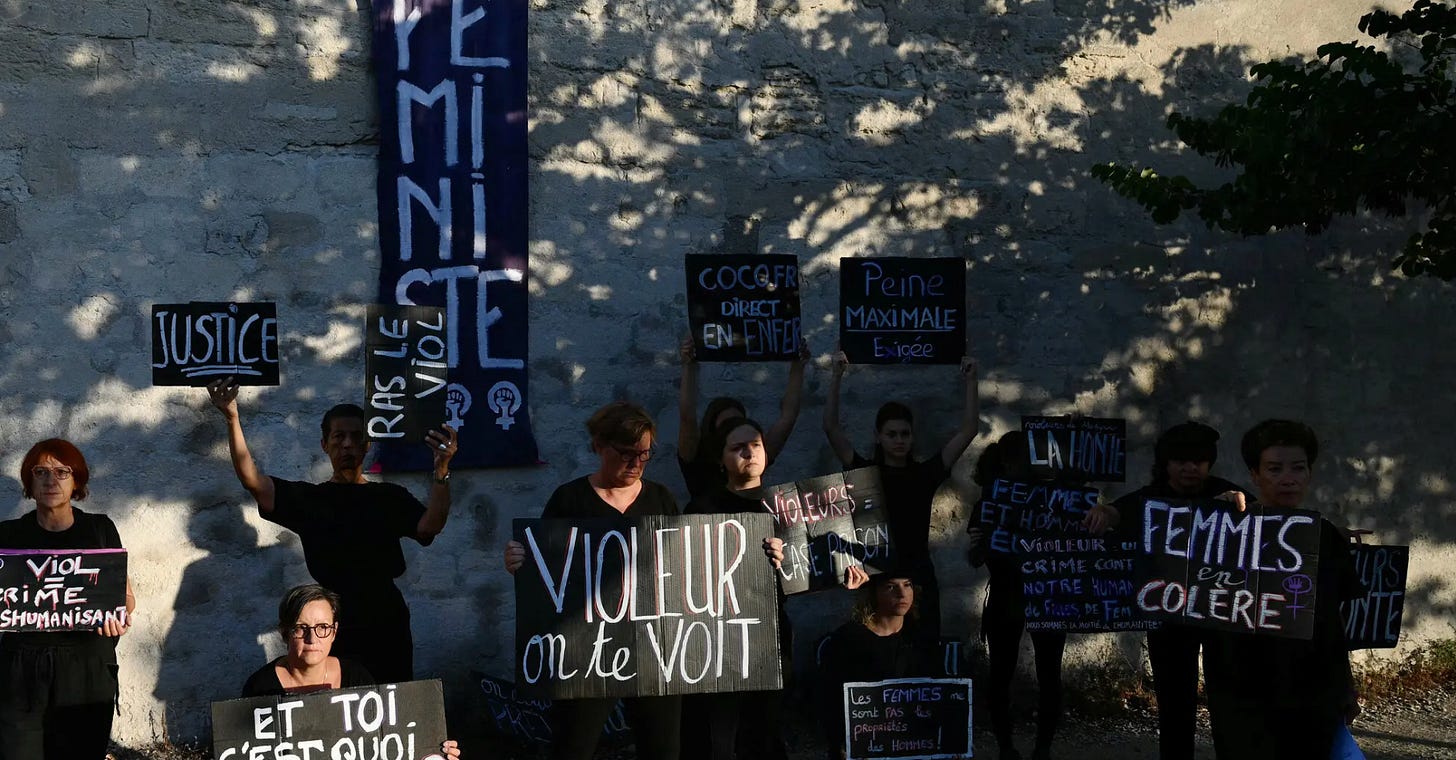Our Answer to "Not All Men" is It's TOO Many Men
"How ever do we trust our fathers, husbands, and grandfathers when they've participated in violence against women?"
This is the start of a series of hard conversations because they need to happen NOW. And this is not designed to be just “a conversation.”
I am creating an environment here where we can include practical aspects and I’ll share methodologies for us to emotionally process and start our inner work on Power Imbalances — which is at the core of violence against women.
This is part of our expanded conversation for Womxn Are Revolutionary Leaders (the evolution of Women Leading the Collaboration Revolution)
Below is an image depicting the queue of defendants awaiting admission to court.
My commitment here
I'm fired up and ready to take on the elephant in the room—the deep-seated power imbalances that fuel male violence against women.
We can't ignore cases like Gisèle Pélicot's in France, and that's why I'm inviting you to join me in this crucial conversation. We'll dive into real-time examples, challenging ourselves and each other to face our conscious and subconscious biases head-on.
And yeah, I'm looking at you, cynics—your skepticism can be a sharp tool, but don't let it become a shield against self-reflection and growth. This isn't a one-and-done deal; we're in this for the long haul, with multiple conversations aimed at sparking a revolution in our thinking.
It's time to get loud, get real, and get results.
This conversation is open to all who are committed to creating meaningful change.
Especially for those who have been impacted by power imbalances and violence against women.
Our conversation here is not just an outlet for outrage, but a call to action and accountability.
While men are invited to join, it's crucial that they listen, learn, and take responsibility for their role in perpetuating these issues.
As women, we can no longer wait for men to take the lead; we must be the drivers of change. Let's turn our righteous anger into a force for transformation and build a future where justice and equality prevail.
DISCLAIMER:
Please note that while the topics discussed in these posts are aimed at facilitating self-reflection and growth, they may also bring up difficult emotions or memories. It's essential that you prioritize your mental and emotional well-being as you engage in this dialogue. The author is not a licensed therapist, as a professional advisor, I will share methods and modalities as suggestions that are for educational and self-help purposes only. If you find yourself struggling with the content or need additional support, please reach out to a trusted mental health professional or helpline.
Here is an initial outline of our discussion.
Your comments and input are taken into consideration for how we adapt this outline and add to the conversation.
I. Unpacking Power Imbalances
A. Historical context of patriarchal systems
B. Societal structures that perpetuate inequality
C. The role of privilege and oppression
II. Real-Time Examples
A. Recent cases of violence against women
B. Everyday examples of power imbalances
C. How these issues manifest in our own lives
III. Self-Reflection and Growth
A. Identifying personal biases and conditioning
B. Strategies for personal transformation
C. Encouraging dialogue and empathy
IV. Moving Forward: Creating Change
A. Small steps individuals can take
B. The importance of collective action
C. Building a more just and equitable future
To ensure you receive notifications of each conversation/post
Let’s start by identifying and exploring our emotions evoked by Gisele Pélicot's case:
Shock and Horror: Many of us may feel a deep sense of shock and horror upon hearing about the atrocities Gisèle endured. These feelings serve as a reminder that, despite progress, there is still a long way to go in the fight for women's safety and autonomy.
Anger and Frustration: The injustice and violence that Gisèle experienced can evoke feelings of anger and frustration, especially when we consider how common such stories are around the world. It's natural to feel outraged that these abuses continue to occur.
Empathy and Compassion: Gisèle's courage in speaking out may inspire feelings of empathy and compassion for her and other survivors of violence. These emotions can motivate us to support and uplift those who have been harmed.
By acknowledging and exploring these feelings, we can create a foundation for productive dialogue and action.
Will you use your journal to process or will you use therapy or a series of deep listening sessions? Pick one or two and start now.
We can discuss this with each other here in the comments.
What I know is DO NOT HOLD IT IN.
When we hold in emotions it is absorbed by our cells and can become an illness or disease.
What can we start demanding?
Is accountability of one form of violence connected to another?
Now that the parent of last week's school shooter is finally being held accountable and charged, we must ask ourselves: why is holding people responsible for their actions not the norm?
It's time to stop making excuses about how we can't prosecute men for crimes they haven't yet committed, and instead, make even threats and verbal abuse against women a punishable offense.
Indeed, holding people accountable for their actions (or inactions) is a crucial aspect of creating a just society.
Here are some points to consider in this context:
Normalizing Accountability: Accountability should be a standard expectation in all aspects of society, not just in isolated cases. Consistent consequences for harmful behavior can act as a deterrent and send a message that such actions will not be tolerated.
Preventive Measures: While it may be challenging to prosecute someone for a crime that hasn't yet occurred, we can take steps to prevent potential violence by criminalizing threats and hateful language. This would provide legal recourse for women who are being targeted and create a safer environment for everyone.
Educating the Public: It's important to raise awareness about the importance of accountability and the impact of harmful behaviors. By educating people about these issues and encouraging them to speak up when they see injustice, we can work towards creating a culture that values responsibility and compassion.
TOO Many Men Stood By and…
Within a small community of less than 7000 inhabitants, comprising individuals of various genders and ages, approximately 3000 adult men reside. Astonishingly, over 90 men responded affirmatively to an abhorrent advertisement promoting the sexual assault of an unconscious woman.
Too many men in this town failed to protect her.
These men actively engaged in this heinous act. A rough estimation indicates that for every 10 men who came across the advertisement, at least one participated in this crime.
Too many men believed they could exploit her with impunity.
When women are told "not all men," remember that it's impossible to distinguish which men pose a threat. Husbands, fathers, grandfathers, and neighbors – men from all walks of life were complicit in this horrific case.
Moreover, hundreds more, possibly around 1000, were aware of its existence yet failed to notify the authorities.
Too many men chose to remain silent in the face of evil.
Two individuals, despite initially arriving with the intention to participate, ultimately decided against it; however, they still neglected to report the situation. This troubling fact highlights the complicity of every man who became aware of this incident yet chose to remain silent or engage in voyeurism.
Too many men avoided taking action when it was needed the most.
Various LinkedIn discussions surrounding the implementation of the new 'Upskirting law' have occurred, with some arguing that "feminism has gone too far." However, without this legislation, the perpetrator may have continued evading justice, given the evident lack of concern from the men aware of his actions.
Too many men allowed the violation to continue.
Consider how the rampant consumption of pornographic content without verifying the age or consent of the subjects involved further perpetuates this culture of apathy. Question whether every man has actively confronted inappropriate behavior from friends, or understands the importance of seeking explicit consent before acting upon their desires.
Too many men ignore the consequences of their actions or the actions of others.
This case has deeply affected many in the community, and dismissive responses such as "women abuse too" or "Not all men" are neither helpful nor appropriate. Too many men choose to deflect rather than engage in self-reflection. Instead, take time to reflect on personal contributions to this pervasive problem, resist the urge to become defensive, and actively seek ways to be part of the solution.
Too many men remain silent; it's time to stand up and fight for change.
Too many men failed to protect a woman in need.
Our next conversation is on —
Unpacking Power Imbalances
Thank you for participating and bringing your voice to the conversation so that we are building trust and determining what are our next actions - individually and as a collective.
If we are just now meeting, my name is Michele Price, CEO of Breakthrough Business Strategies, a communication strategist and leadership advisor who works with CEOs, Business Owners, and Sr.Leaders to develop their emotional cadence with their leadership.
You can also find me on Linkedin.
You are invited to get to know us via Womxn Are Revolutionary Leaders - a weekly Linkedin Audio event







